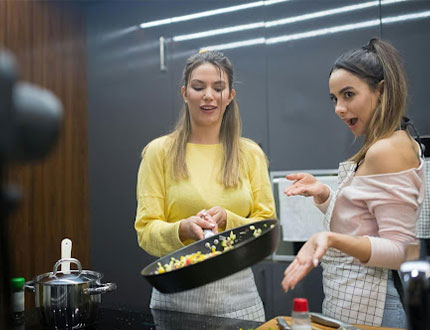It can be messy and overwhelming to juggle scholastic obligations and a culinary interest, much like trying to bake a cake while reading a textbook. However, you can pursue both goals without sacrificing either if you take the proper method. Although studying and cooking may seem like complete opposites, they can work together to produce a healthy and satisfying lifestyle. Let’s explore how you can bring about this harmony.
The Magnificence of Juggling Two Passions
More than just a pastime, cooking is a means of self-expression, stress relief, and self-nurturing. Academics, on the other hand, give you the knowledge and abilities you need to achieve your future objectives. These two areas can actually work in tandem, despite the fact that they could appear to be vying for your attention. While academic success might give you the confidence to take on challenging culinary undertakings, cooking can provide you the mental respite you need from your academics.
Consider your interests as ingredients in a recipe rather than as competing interests. When carefully blended, they can produce a happy and successful way of life.
Effective time management is essential
Learning time management skills is essential to handling a busy schedule, and using a tool like My Hours can make it easier to balance hobbies like cooking with school responsibilities. Investigating services that let you assign jobs to others is one technique to reduce the workload. You can search “pay someone to do my homework online” if you’re feeling overwhelmed, freeing up time to concentrate on other important tasks. This method guarantees that you fulfil your academic responsibilities while still having time to engage in creative culinary endeavors. You can maximize your limited time and preserve your mental well-being by assigning non-essential duties to others.
For instance, you could set off the evenings for culinary experiments and the mornings for concentrated study sessions when your mind is clear. You can streamline your culinary routine during exam weeks by making short meals or reheating recipes that have already been made. Enjoy creating those intricate meals you’ve been dreaming of on days when things aren’t as busy.
Using Cooking as a Break for Productivity
Cooking can be more than simply a pastime; it can be a useful way to unwind. Imagine this: going into the kitchen to cut vegetables or knead bread might feel therapeutic after spending hours reading textbooks. By using many brain regions, it enables you to stay productive while recharging.
Additionally, cooking imparts useful abilities outside of the kitchen. It improves problem-solving skills, creativity, and attention to detail—all of which are equally beneficial in the classroom. Even as academic pressure mounts, you may justify the time you spend on your culinary love by seeing it as a tool for personal development.
 Remaining Adaptable and Practical
Remaining Adaptable and Practical
Even the most well-laid plans can go awry because student life is unpredictable. There will be days when you have to put an essential task ahead of attempting a new recipe. On other days, when you need a mental break from studying, you may choose to dedicate more time to mastering a recipe. Being adaptable is essential while juggling two passions.
Setting reasonable goals for oneself is also crucial. You don’t have to provide fine dining every day or get flawless results on every test. You can avoid needless stress by learning to prioritize and accepting that you can’t accomplish it all.
Bringing Academic Objectives and Culinary Passion Together
Finding innovative methods to combine scholastic objectives with a passion for cooking may be a rewarding experience. Writing on food-related subjects in your schoolwork, for instance, might help you link your love of cooking with your academic pursuits. If you’re given an essay, think about drawing inspiration from proposal essay examples for students to come up with a subject that fascinates you. You might demonstrate your passion for cooking while meeting academic requirements by writing a proposal essay about implementing cooking classes at your school or encouraging healthier eating practices on campus. In addition to keeping you interested, this tactic improves your capacity to incorporate your interests into your educational process.
Cooking can also be used as a study tool. You can learn while cooking without losing your cooking time by listening to lectures or podcasts that have been recorded. It sustains both passions in a win-win situation.
The Function of Preparing Meals
Cooking can be soothing, but during hectic academic times, making meals every day can feel like a chore. This is when meal prep, or meal preparation, turns becomes your secret weapon. You may save valuable time and energy by devoting a few hours each week to prepping and storing meals. Simple, wholesome meals that may be prepared in large quantities include pasta, stir-fries, and soups.
With meal prep, you can eat healthily without sacrificing study time because you’ll have prepared meals available when you need them. Knowing that you have one less item to worry about also helps you feel less stressed.
The Benefits of Equilibrium
It’s about improving your life, not simply managing your time, when you combine your love of cooking with your academic objectives. Cooking provides a creative diversion from the demands of learning, enabling you to rejuvenate both your body and mind. Achieving scholastic success, on the other hand, boosts your self-esteem and discipline, which you may use in the kitchen.
There are also unanticipated advantages to this balance. Making your own food enhances your physical well-being, which increases your energy and concentration for learning. Your ability to cook may even lead to opportunities, such as connecting with people over meals or making additional money by selling baked products.
In conclusion
Like creating a complicated meal, juggling a passion of cooking with academic obligations calls for preparation, perseverance, and a little bit of imagination. You may succeed in both areas if you manage your time well, maintain flexibility, and look for opportunities to combine your interests. Keep in mind that this path is about building a full life where your goals and passions complement one another, not merely about finding balance. So take out your apron and your textbooks and begin creating a future that fulfills your desire to learn and your culinary aspirations.

